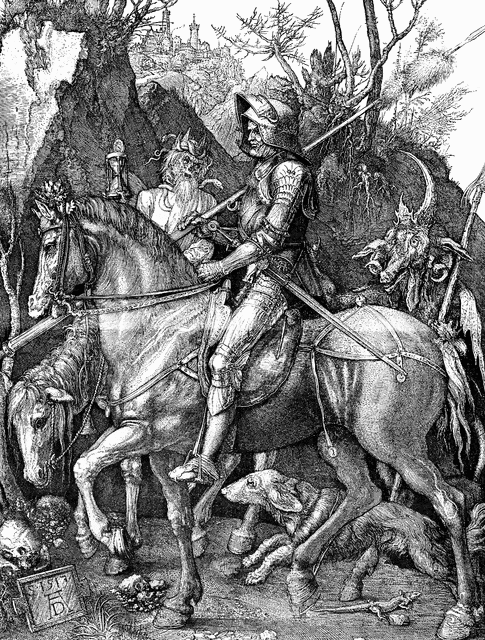History's Warriors: Knights
For the next week, we're going to take a look at four of history's most famed and fearsome groups of warriors and consider how their lives can teach us to live boundlessly. Today, we look at the Medieval Knights.
By Greyson Gilbert
"A true knight is
fuller of bravery in the midst, than in the beginning of danger."
-Sir Philip Sidney
There might not be a nobler image in Western history. A Knight in shining armor, atop his warhorse with sword drawn high in the air. To achieve such a high status in Medieval society was no easy task, and took years of dedication and work. Knights embraced the GRIND.
They were some of history's most loyal, brave, and disciplined warriors.
They were some of history's most loyal, brave, and disciplined warriors.
Every Knight had to climb the ladder.
Boys who
were on the path to becoming knights served as pages from the age of 7 to
14. Pages were taken care of by the women of the community and did menial
labor. When a boy reached the age of 14, he was considered to be a
squire. Squires were essentially the armor bearers, errand runners, and
apprentices of knights. Every knight of the middle ages began first as a
squire and worked his way up the ladder, learning from strict training under
his master before he had to prove himself in knighthood.
Before becoming a knight, squires were instructed in the Code of Chivalry (which I'll get to in a minute), horsemanship, swordsmanship, marksmanship, climbing skills, athletics, and swimming skills (crucial in situations related to a castle siege), and bravery. One of the most important aspects of the training was forging the ability to withstand extremes in cold, heat, tiredness and hunger. They also became well versed in the arts, such as music and dancing, and courtly etiquette. They emphasized, like the Samurai, the need for warriors to be well versed in not only combat but the arts also.
A 13th century knight, named
Ramon Llull, wrote a detailed account of the intense knighting ceremony. When a
squire reached 21 years old, had the recommendation of a knight, and had
fulfilled the necessary training, he was to be knighted. The days long ceremony
came to it's dramatic apex when a sword is bestowed upon the squire. Llull
describes what happens next:
"To signify charity [the knight] must kiss the squire and give him a hard slap so that he will remember what he is promising and the great burden he must carry and the great honour he is taking through the Order of Chivalry."
The slap serves as a reminder of the hardship that he will undergo in his service. It is a crucial part of the ceremony, and with that strike, the squire becomes a knight.
The Code of Chivalry
Chivalry is what knights
are most remembered for, but the specifics were not codified until the 14th
century. Still, Knights before then swore by a code that resembled honor,
dignity, and discipline. This code became a set of strict guidelines that Knights must
follow in their service. The principles of the Code were eventually written and
given to us in The Song of Roland, a Middle Ages document. The
following are just a few of the many duties of Medieval Knights.
To protect the weak and defenseless and to care for orphans and widows.
We who are able are also
called to defend those who cannot defend themselves against all forms of
evil and oppression. How many of us today only look out for ourselves?
To refrain from the wanton giving of offense.
Knights were called to
have self-control and only do damage as is necessary. Where is our self-control
today?
To live by honour and for glory.
They followed a strict
code of honor with discipline. How much discipline do we have today in
holding true to the values that we have swore to abide by?
To despise pecuniary reward.
Although many wanted to
reward Knights for their service with money, Knights were called to refuse. It
was God's service they were doing, and not for their own profit. How selfish
are we, that too often we only want to help and serve if their is something in
it for us?
At all times to speak the truth.
It is simple, yet
difficult. How often do we neglect the truth for personal gain?
To persevere to the end in any enterprise begun.
This was the Knight's
version of "finish what you start." How often do we give up in
endeavors and trials because they are "too hard" or "I'm
not good enough"? Never give up, finish what you start.
Never to refuse a challenge from an equal.
Whether it be a duel or a
battle, it was considered disgraceful to refuse a challenge from one of equal
skill because of fear. They were taught to invite challenge,
which catalyses growth.
Finally, Knights were called to live, fight, and die by the following virtues:
- Faith
- Charity
- Justice
- Sagacity (good judgement)
- Prudence
- Temperance
- Resolution
- Truth
- Liberality (free from prejudice)
- Diligence
- Hope
- Valor









Comments
Post a Comment